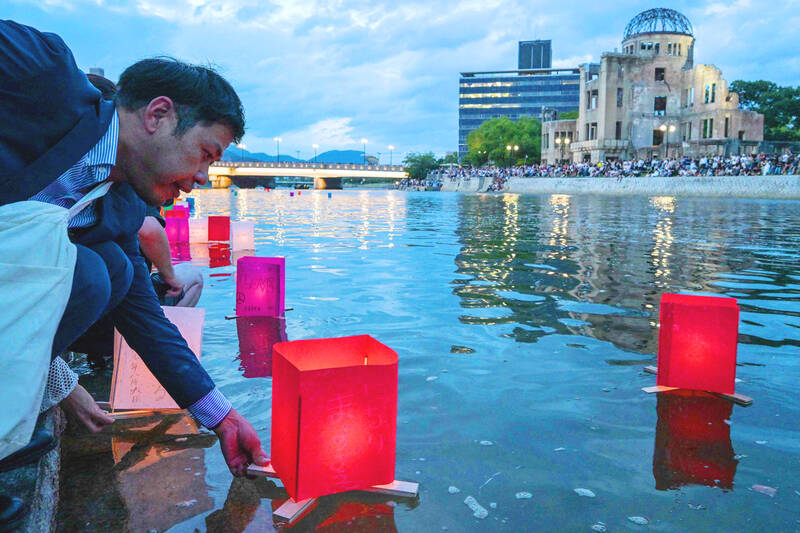Hiroshima yesterday marked the 80th anniversary of the US atomic bombing of the western Japanese city, with many survivors expressing frustration about the growing support of global leaders for nuclear weapons as a deterrence.
With the number of survivors rapidly declining and their average age now exceeding 86, the anniversary is considered the last milestone event for many of them.
“There will be nobody left to pass on this sad and painful experience in 10 years or 20 years,” Minoru Suzuto, a 94-year-old survivor, said after he kneeled down to pray at the cenotaph. “That’s why I want to share [my story] as much as I can.”

Photo: AFP
The bombing of Hiroshima on Aug. 6, 1945, destroyed the city and killed 140,000 people. A second bomb dropped three days later on Nagasaki killed 70,000. Japan surrendered on Aug. 15, ending World War II and Japan’s nearly half-century of aggression in Asia.
Hiroshima Mayor Kazumi Matsui warned against a growing acceptance of military buildups and of using nuclear weapons for national security during Russia’s war in Ukraine and conflicts in the Middle East, with the US and Russia possessing most of the world’s nuclear warheads.
“These developments flagrantly disregard the lessons the international community should have learned from the tragedies of history,” Matsui said. “They threaten to topple the peacebuilding frameworks so many have worked so hard to construct.”
He urged younger generations to recognize that such “misguided policies” could cause “utterly inhumane” consequences for their future.
“We don’t have much time left, while we face a greater nuclear threat than ever,” said Nihon Hidankyo, a Japanese grassroots organization of survivors that won the Nobel Peace Prize last year for its pursuit of nuclear abolishment.
“Our biggest challenge now is to change, even just a little, nuclear weapons states that give us the cold shoulder,” the organization said in a statement.

Right-wing political scientist Laura Fernandez on Sunday won Costa Rica’s presidential election by a landslide, after promising to crack down on rising violence linked to the cocaine trade. Fernandez’s nearest rival, economist Alvaro Ramos, conceded defeat as results showed the ruling party far exceeding the threshold of 40 percent needed to avoid a runoff. With 94 percent of polling stations counted, the political heir of outgoing Costa Rican President Rodrigo Chaves had captured 48.3 percent of the vote compared with Ramos’ 33.4 percent, the Supreme Electoral Tribunal said. As soon as the first results were announced, members of Fernandez’s Sovereign People’s Party

MORE RESPONSIBILITY: Draftees would be expected to fight alongside professional soldiers, likely requiring the transformation of some training brigades into combat units The armed forces are to start incorporating new conscripts into combined arms brigades this year to enhance combat readiness, the Executive Yuan’s latest policy report said. The new policy would affect Taiwanese men entering the military for their compulsory service, which was extended to one year under reforms by then-president Tsai Ing-wen (蔡英文) in 2022. The conscripts would be trained to operate machine guns, uncrewed aerial vehicles, anti-tank guided missile launchers and Stinger air defense systems, the report said, adding that the basic training would be lengthened to eight weeks. After basic training, conscripts would be sorted into infantry battalions that would take

GROWING AMBITIONS: The scale and tempo of the operations show that the Strait has become the core theater for China to expand its security interests, the report said Chinese military aircraft incursions around Taiwan have surged nearly 15-fold over the past five years, according to a report released yesterday by the Democratic Progressive Party’s (DPP) Department of China Affairs. Sorties in the Taiwan Strait were previously irregular, totaling 380 in 2020, but have since evolved into routine operations, the report showed. “This demonstrates that the Taiwan Strait has become both the starting point and testing ground for Beijing’s expansionist ambitions,” it said. Driven by military expansionism, China is systematically pursuing actions aimed at altering the regional “status quo,” the department said, adding that Taiwan represents the most critical link in China’s

EMERGING FIELDS: The Chinese president said that the two countries would explore cooperation in green technology, the digital economy and artificial intelligence Chinese President Xi Jinping (習近平) yesterday called for an “equal and orderly multipolar world” in the face of “unilateral bullying,” in an apparent jab at the US. Xi was speaking during talks in Beijing with Uruguayan President Yamandu Orsi, the first South American leader to visit China since US special forces captured then-Venezuelan president Nicolas Maduro last month — an operation that Beijing condemned as a violation of sovereignty. Orsi follows a slew of leaders to have visited China seeking to boost ties with the world’s second-largest economy to hedge against US President Donald Trump’s increasingly unpredictable administration. “The international situation is fraught